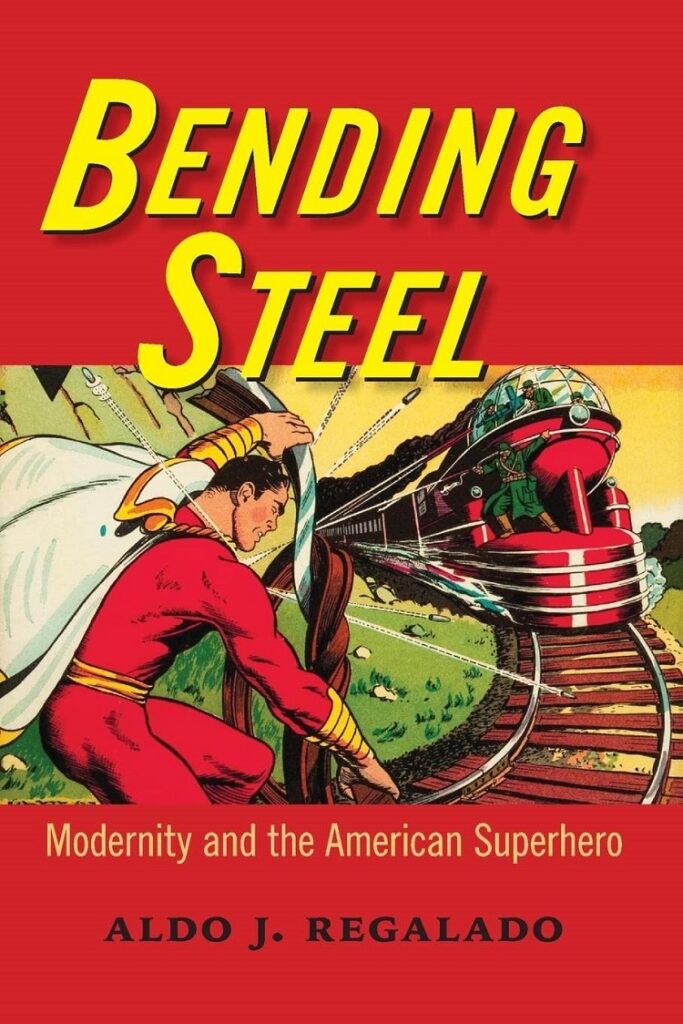
Written by Kristen Lopez
I’m an avid book reader and it’s because of this avidity that I can read freely under the guise of “working.” Kristen’s Book Club will help you find the perfect film-related – or should be filmed – book to spend time with each month. We’ll also look at upcoming novels soon to be adapted for the big screen. In this inaugural column we’ll explore Superman’s origins, more from the star of Martin Scorsese’s Goodfellas, and a Hollywood director receiving the biography treatment.
Bending Steel by Alan J. Regalado
One of the more analytical books available this month is Alan J. Regalado’s Bending Steel, investigating the role of superheroes in conjunction with the changing definitions of modernity. Starting with the work of hero Natty Bumppo before segueing into examination on Tarzan and, ultimately, Superman, the fluctuating reasons for why America takes to certain heroes comes into focus.
Whether it is in response to differing depictions of masculinity, the desire for westward expansion and Manifest Destiny, attitudes towards racism and nuclear fallout, we’re a nation desperate for heroes of the super variety. Regalado’s text is very clinical, almost too much so at times, and it can be pretty dry reading. If you’re a fan of texts charting changes and transformations in popular culture, this will certainly do the trick.
The Lufthansa Heist by Henry Hill and Daniel Simone
Henry Hill is best known as the mobster depicted by Ray Liotta in Martin Scorsese’s Goodfellas. The inspiration for that tale of violence and made men was author Nicolas Pileggi’s Wiseguys, although Hill later came out and wrote about his experiences. Hill died back in 2012 but not before revealing the details on one of the greatest unrecovered heists in history.
Hill and his compatriots robbing of the Lufthansa air hangar was mentioned in Scorsese’s film but Hill and co-writer Daniel Simone explore the creation of the idea, how easy it was robbing Kennedy airport in the past, and what happened to the cash when things went sour. There is a tendency for things to play on ethnic stereotypes, with the random insertion of lone Italian words becoming so hokey, and the shifting from Hill’s first-person voice to an omniscient third-person narrator leads to boring sections detailed by Hill – where he emphasizes the near choir-boy of a mobster that he was – and the more interesting and unbiased facts. This is definitely a tome that would make for an amazing film, although Scorsese would need to helm it.
Sidney J. Furie: Life and Films by Daniel Kremer
Sidney J. Furie is a director whose name might leave you saying, “Huh?” Most often considered a journeyman director Furie’s diverse body of work includes an awards-worthy biopic (Lady Sings the Blues), horror (The Entity), and even a big-budget – or it was supposed to be – superhero film (Superman IV: The Quest for Piece).
Author Daniel Kremer seeks to illustrate Furie’s “three lives” as a director in the U.S., Canada, and England. Often compared to Norman Jewison and Ted Kotcheff, Furie is more often faulted for what he turned down – A Hard Day’s Night, was the producer’s first choice for The Godfather – than what he did. Kremer showcases a series of tropes and ideals the director delved into throughout all his films, and while some of Kremer’s assertions might be stretching, he makes a compelling argument against the idea of Furie as a director for hire.
A man who revered testing the limits of film composition and the anamorphic widescreen process, Kremer produces a solid biography about a director not many people know about. Furie himself is incredibly humble, recounting intimate details on the backstage goings-on with his films, many of which suffered from troubled productions and inflated egos, and each of the films covered blends Furie’s personal stories with Kremer’s in-depth analysis of each as a body of work in Furie’s directorial canon. If you’ve enjoyed any of Furie’s films this gives far more information on him than any director commentary.